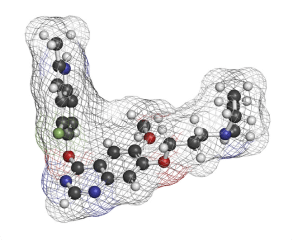Get in Touch
Have questions? Call or chat with our Patient Advocates for answers.
Cediranib is an experimental anti-angiogenesis drug that helps control tumor growth and metastasis. Researchers are testing it in combination with chemotherapy drugs. It has produced mixed results in clinical trials for pleural mesothelioma patients.

Written by Karen Selby, RN | Medically Reviewed By Dr. Rupesh Kotecha | Edited By Walter Pacheco | Last Update: June 27, 2024
Cediranib is an anti-angiogenesis drug, similar to bevacizumab (Avastin). It works by blocking a type of protein called vascular endothelial growth factors (VEGF).
The body uses VEGF to grow new blood vessels and heal itself. This process is called angiogenesis. However, tumors also rely on angiogenesis to grow and spread cancer cells throughout the body.
Cediranib Fast Facts
Halting angiogenesis can starve tumors and prevent metastasis, but it can also cause severe side effects for patients. The main challenge for researchers is safely adding anti-angiogenesis drugs into chemotherapy regimens.
Cediranib has not been approved by the U.S. Food and Drug Administration. Various clinical trials are testing cediranib for solid tumors, including pleural mesothelioma.

Gain access to top mesothelioma doctors and get help scheduling appointments.
Connect NowEarly clinical trials tested high-dose cediranib after chemotherapy. These high doses resulted in many complications and little benefit.
More recent trials have tried lower-dose cediranib in combination with standard chemotherapy. They also produced weak results. A 2021 study ended with similar results. It concluded that the drug should be tested in combination with chemotherapy.
In 2011, the Journal of Thoracic Oncology published the results of a phase II study. Researchers evaluated 47 pleural mesothelioma patients. The patients received a daily 45 mg dose of cediranib after finishing chemotherapy.
Tumors shrank in four of the patients, but more than half the study group experienced fatigue, diarrhea and high blood pressure. Almost all the patients required a dose reduction.
A 2012 article in Lung Cancer reported the results of a similar phase II trial which evaluated 50 patients. Patients were initially given 45 mg of cediranib each day. The researchers later lowered the dose to 30 mg.
The researchers observed that disease control was better at the higher dose, but it resulted in many severe side effects.
In 2017, a phase I trial combined cediranib with chemotherapy for pleural mesothelioma. It found that a 20 mg daily dose of cediranib was safe to take between cycles of Alimta (pemetrexed) and cisplatin.
The following year, researchers conducted a phase II trial with 92 pleural mesothelioma patients. Some of the patients received standard chemotherapy and cediranib. Others received chemotherapy plus a placebo.
Median survival was 10 months for the cediranib group and 8.5 months for the placebo group. The cediranib group was about three times more likely to experience diarrhea and high blood pressure.
It is important for people with mesothelioma to talk to a doctor who knows about the disease to find out which treatments might be best for them.
Recommended ReadingYour web browser is no longer supported by Microsoft. Update your browser for more security, speed and compatibility.
If you are looking for mesothelioma support, please contact our Patient Advocates at (855) 404-4592
The Mesothelioma Center at Asbestos.com has provided patients and their loved ones the most updated and reliable information on mesothelioma and asbestos exposure since 2006.
Our team of Patient Advocates includes a medical doctor, a registered nurse, health services administrators, veterans, VA-accredited Claims Agents, an oncology patient navigator and hospice care expert. Their combined expertise means we help any mesothelioma patient or loved one through every step of their cancer journey.
More than 30 contributors, including mesothelioma doctors, survivors, health care professionals and other experts, have peer-reviewed our website and written unique research-driven articles to ensure you get the highest-quality medical and health information.
My family has only the highest compliment for the assistance and support that we received from The Mesothelioma Center. This is a staff of compassionate and knowledgeable individuals who respect what your family is experiencing and who go the extra mile to make an unfortunate diagnosis less stressful. Information and assistance were provided by The Mesothelioma Center at no cost to our family.LashawnMesothelioma patient’s daughter


Selby, K. (2024, June 27). Cediranib. Asbestos.com. Retrieved October 22, 2024, from https://www.asbestos.com/treatment/drugs/cediranib/
Selby, Karen. "Cediranib." Asbestos.com, 27 Jun 2024, https://www.asbestos.com/treatment/drugs/cediranib/.
Selby, Karen. "Cediranib." Asbestos.com. Last modified June 27, 2024. https://www.asbestos.com/treatment/drugs/cediranib/.
A medical doctor who specializes in mesothelioma or cancer treatment reviewed the content on this page to ensure it meets current medical standards and accuracy.
Please read our editorial guidelines to learn more about our content creation and review process.
Dr. Rupesh Kotecha is a renowned radiation oncologist in leadership roles at Miami Cancer Institute. He is an associate professor at Florida International University's college of medicine and an adjunct faculty member at Memorial Sloan Kettering.
Mesothelioma Center - Vital Services for Cancer Patients & Families doesn’t believe in selling customer information. However, as required by the new California Consumer Privacy Act (CCPA), you may record your preference to view or remove your personal information by completing the form below.
